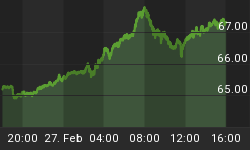Below is an excerpt from a commentary originally posted at www.speculative-investor.com on 2nd December, 2010.
The most vociferous commodity bulls tend to be China bulls, and rightly so given that the price gains achieved across the industrial commodity complex over the past 12 months can only be justified by making the assumption that China will continue its rapid growth. China's importance to the commodity world stems from the fact that the bulk of its growth involves fixed-asset investment, which means that the growth is commodity-intensive. The risk to the bullish case is that a substantial chunk of this growth in fixed-asset investment is linked to a building boom that, to put it mildly, does not appear to be sustainable. To put it more bluntly, China's current building boom ranks with the construction of Qin Shi Huang's tomb* as one of history's all-time great examples of mal-investment.
One of the most prominent bears on China is Jim Chanos, a hedge fund manager who became well known about 10 years ago after making a large bearish bet against a highly regarded company (Enron) that he correctly identified as a giant scam. Chanos lays out his reasons for being bearish on China -- and, by extension, on commodities such as iron-ore that rely heavily on Chinese demand -- in the interview posted HERE. One of the key points is that a lot of the residential and commercial buildings that have been constructed in China over the past few years remain empty, and yet new buildings continue to go up at a frenetic pace. There appears to be a complete absence of traditional return-on-investment considerations, especially in the residential property market, in that investors often have no intention of generating any rental income from the houses and apartments they purchase. Renting is thought to be pointless, because even if a tenant could be found the yield would be so low that it wouldn't be worth the trouble. Instead, the plan in very many cases is simply to buy a property, hold onto it for a few years, and then sell it for a large profit. In other words, in China today the "greater fool theory" is being put into practice on a phenomenal scale.
Monetary inflation is invariably one of the driving forces behind a major investment bubble, the reason being that a steep multi-year upward trend in prices could never occur within an important sector of the economy (such as real estate) without a veritable flood of new money. The new money and its price-related effects don't spread evenly over the economy; rather, some prices always rise faster than others, which can set in motion a self-reinforcing feedback loop (an increase in price attracts investment/speculation that leads to an additional increase in price, etc.) that eventually reaches bubble proportions. If the money-supply growth that supports the bubble then slows or stops, the bubble bursts and the consequences of years of poor resource allocation come to the fore. Alternatively, if the monetary authorities decide to keep the money supply growing rapidly in an effort to indefinitely postpone the 'day of reckoning', the eventual result will be hyperinflation.
China has possibly now reached a critical juncture where the monetary authorities are forced to make a choice between keeping the fixed-asset investment bubble going and thus risking hyperinflation, or addressing the mushrooming inflationary pressure by slowing/stopping the monetary expansion. The choice is being forced upon them at this time by sharp rises in food prices and the social unrest that such price rises foment in a country where a large section of the population spends about half its income on food. We suspect that they will try to avoid hyperinflation and will, instead, attempt to gradually deflate the fixed-asset investment bubble.
The thing is, bubbles never deflate gradually. This is why we remain concerned about downside risk in the industrial commodities whose supply/demand equations have come to be dominated by Chinese demand.
The commodities that would be most adversely affected by the bursting of the China bubble and the consequent reduction in Chinese commodity consumption are the industrial metals. Oil also looks vulnerable to us, but uranium does not because we expect that China's plans to increase its nuclear power generation capacity will remain in place almost regardless of what happens in the real estate market. We doubt that gold would be adversely affected beyond short-term knee-jerk reactions, because gold is mostly held for wealth-preservation purposes and therefore tends to fare relatively well when economic problems abound.
*In the third century BC, about 700,000 workers laboured for almost 4 decades to build the final resting place of Qin Shi Huang, China's first emperor. The work included the sculpting of the famous Terracotta Army of Xi'an.
We aren't offering a free trial subscription at this time, but free samples of our work (excerpts from our regular commentaries) can be viewed at: http://www.speculative-investor.com/new/freesamples.html















